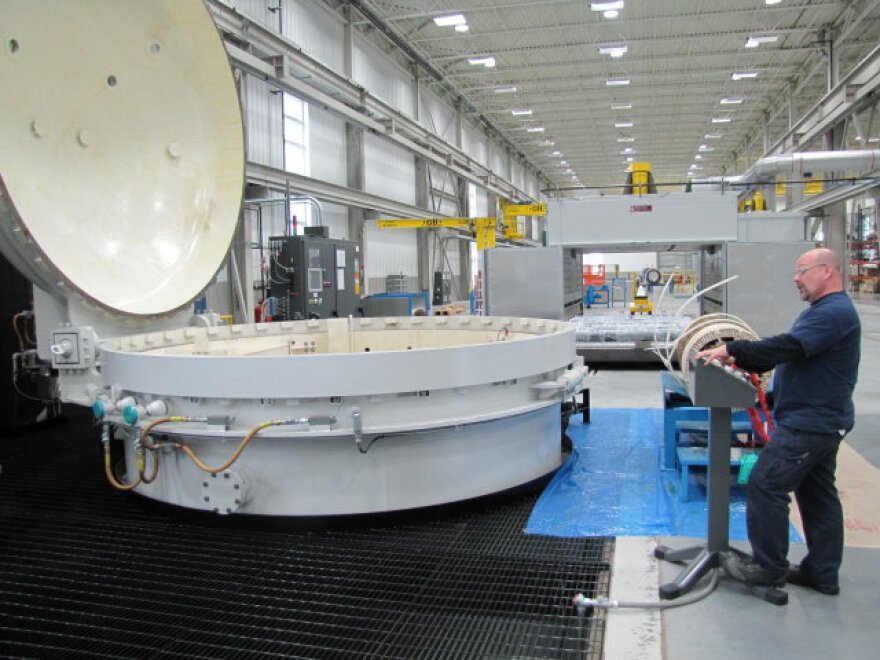All week, WUWM has been digging into the complexities of the skills gap.
Our journalists have gathered the perspectives employers hungry to hire AND of workers eager to land good paying jobs.
Environmental Reporter Susan Bence sets out to learn if “skills gap” applies to local green industry.
You can’t get much greener than the Ingeteam operation in Milwaukee’s Menomonee Valley. Overhead windows naturally light the production floor.
A highly efficient heating and cooling system cocoons workers as they pour pour over minute components of electronic control systems.
CEO Aitor Sotes describes Ingeteam’s creations as the guts and brains of wind turbines.
“We try to maintain this as spotless; I think it’s a good place to work,” Sotes says.
Yet much of its factory remains vacant.
Sotes’ goal is to have 275 skilled employees on staff by 2015, so the operation can bustle around the clock.
So far, he’s been able to hire only 65.
“The quantity of that type of personnel, it’s either not there or we have not been able to attract to our company,” Sotes says.
Sotes admits he’s dumbfounded.
Even an imposing sign outside reading “Ingeteam Now Hiring” has failed to bring job seekers to his doorstep.
“We expected to have a bigger flow of people applying and we’re not seeing that,” Sotes says.
Human resources manager Matt Gordon says part of the Ingeteam mantra is training, but applicants need “some level” of assembly skills.
“Some blueprint reading,” Gordon says.
CEO Aitor Sotes chimes in.
“We test every piece of equipment; I mean every single one has to be perfect because you don’t want to have to replace a generator when it’s 300 feet up in the air – it’s very expensive. So our customers expect those things to run flawlessly,” Sotes says.
A few miles northeast, removed from Ingeteam’s world, Sarah Rottersman is prepping students for their exam in solar thermal technology.

She teaches for MCSC – the Milwaukee Community Service Corps.
It helps people attain basic skills - in hopes they’ll be able to get a foot inside the workplace door.
I ask what sort of environmental jobs its students might snag.
“Hazardous waste.and I know that doesn’t sound very green. It’s cleaning up hazardous waste sites. It’s a really gross job, you have to wear the big suit and everything, THOSE are the jobs that are out there right now,” Rotterman says.
Even when it comes to landing “unsexy” green jobs such as cleaning environmental messes or spoiled waterways, Rottersman knows the odds are stacked against her students.
Most live in the heart of Milwaukee, and according to UWM’s Employment and Training Institute, for every 25 job seekers in the central city, there is one job.
Corps member Keauna Shaw wants to set herself apart, by acing every test, including the one on solar energy skills.
“The hardest thing for me, remembering everything. Because it’s a lot of stuff that goes with the solar panels and then figuring in tape measuring into that,” Shaw says.
The 22-year-old says she wants to support her young son, as well as set an example for him. .
”I don’t know, .I’ve been doing pretty good, I just look over my work sheets and I remember a lot of stuff we talk about in class; it kind of helps to pay attention,” Shaw says.
MATC’s Oak Creek is on the other side of town and the other end of the green skills spectrum.
Joe Jacobsen directs its Center for Energy Conservation and Advanced Manufacturing. It takes energy education to its most advanced state.
In fact, Jacobsen says a steady stream of visitors from around the globe come to study its state-of-the art facility and curriculum.
“Of course the ultimate is that students wind up in good jobs – that’s what we’re looking for and they’re getting good jobs. There are a lot of good jobs out there. A student just graduated; he’s the utility manager for all of Rexnord. So these are really good jobs and these students have, I think a very bright future,” Jacobsen says.
Still, Jacobsen says there is more work to do.
For instance, MATC is cultivating relationships with more companies to augment its students hands on experience.
One company is Ingeteam.
From his vantage point as head of the Wisconsin Sustainable Business Council, Tom Eggert has his eye on a different green skills shortage altogether.
Eggert believes the region needs to nurture the next generation of the industry’s inventors and entrepreneurs.
“I’m looking at it from a university perspective. We’re sending students out that have entrepreneurial instincts and they’re looking to go out and start a business and they’ve got some good ideas We’re really strong as a state at getting them initial funding,” Eggert says.
Where Wisconsin falls short, Eggert maintains, is helping to grow and stabilize community-sustaining enterprises.
However, unless more workers train – perhaps in multiple skills, new employers might only widen the existing shortage.


